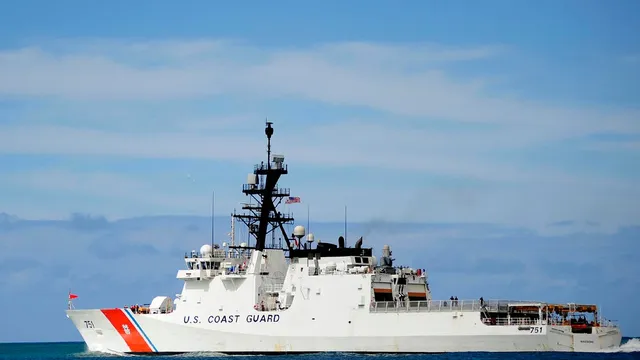
Search suspended for missing seaman from Rancho Cordova after extensive effort
2025-02-18 10:52- Seaman Bryan K. Lee was reported missing on February 4 during a counter-drug patrol in the Eastern Pacific Ocean.
- The search effort covered about 19,000 square nautical miles and involved multiple agencies.
- The U.S. Coast Guard ultimately suspended the search after nearly 190 hours of efforts, offering condolences to Lee's family.
Express your sentiment!
Insights
In the Eastern Pacific Ocean, a comprehensive search was launched for Seaman Bryan K. Lee, a 23-year-old crew member of the U.S. Coast Guard cutter Waesche, after he was reported missing on the morning of February 4. The cutter was conducting routine counter-drug patrols approximately 300 nautical miles south of Mexico when Lee was discovered unaccounted for, prompting immediate action from the Coast Guard and various supporting branches. Over the span of multiple days, search crews utilized aircraft from the Coast Guard, Customs and Border Protection, and the U.S. Air Force, along with assistance from the Mexican Navy, dedicating almost 190 hours to scouring a vast area of about 19,000 square nautical miles. The intense search effort included both aerial and maritime components but ultimately concluded on the following Saturday, after extensive considerations regarding the circumstances surrounding Lee's disappearance. Cmdr. David Stern, the search and rescue mission coordinator for Coast Guard District Eleven, expressed condolences to Lee's family and friends, describing the decision to suspend the search as difficult, yet necessary based on all pertinent factors and available information. The case has drawn attention to the dangers faced by service members in maritime environments and raised questions about future safety measures and protocols during operations far from land. Among the many community members and fellow service personnel mourning, discussions arose over how the incident highlights the risks and uncertainties prevalent in naval service, emphasizing the need for ongoing support for families during such trying times. The conclusion of the search signals the end of a coordinated effort that involved multiple agencies and highlights the impact of disappearance cases on close-knit communities and military families.
Contexts
The policies for addressing missing persons in the military are critical to ensure proper handling of cases involving personnel who are unaccounted for during conflicts, training exercises, or other situations. These policies are designed to provide a systematic approach to search, recover, and ultimately account for service members whose whereabouts are unknown. The Department of Defense (DoD) has established procedures that ensure timely reporting and investigation of missing personnel cases, involving various branches of the military and cooperation between agencies. These policies focus on ensuring that families are kept informed and supported throughout the process, recognizing the emotional toll of uncertainty regarding their loved ones' fates. One critical aspect of the current policies includes the use of specialized teams trained in search and recovery operations. Each branch of the military has dedicated units that can quickly mobilize in the event of a missing person situation. These teams employ advanced technology and methodologies to aid in searches, conducting thorough investigations, including interviews and site examinations, to gather information on the last known whereabouts of the missing service member. Follow-up actions include establishing communication with local authorities, engaging with host nations if the disappearance occurs overseas, and utilizing intelligence capabilities to track down missing members. The policies also emphasize the importance of maintaining detailed records regarding all missing service members. This includes comprehensive documentation of individual cases, timelines of events leading up to the disappearance, and any previous actions taken to locate the individual. This systematic approach allows for ongoing assessment and updates as new information becomes available. Importantly, congressional oversight and support help ensure these policies are adequately funded and that they evolve to meet new challenges, thereby maintaining a robust framework for addressing missing persons. In recent years, there have been efforts to incorporate additional resources and tools to improve the effectiveness of these policies, such as the integration of forensic science and collaboration with non-governmental organizations specializing in missing persons cases. The evolving nature of warfare and military operations necessitates continual review and adaptation of policies to enhance recovery efforts. Overall, the commitment to addressing missing persons within the military reflects an understanding of the significance of accountability and the profound impact that uncertainty can have on service members' families.